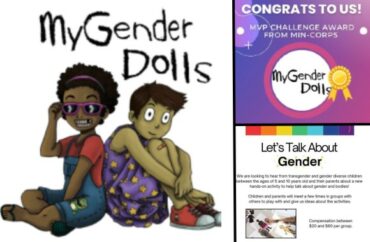
‘MyGender Dolls’ aims to foster children’s gender exploration through ‘interactive’ paper dolls with interchangeable ‘internal reproductive organs’ and ‘external genitalia’
The University of Minnesota appears to have removed details about a controversial “MyGender Dolls” project from its website after the paper dolls, which have interchangeable genitalia and are designed for children, attracted criticism online.
Internet archives of the public university’s website show an article about the project was removed and the project’s main page was changed sometime toward the end of last week.
“As context, MyGender Dolls are therapeutic tools intended for licensed therapists to use with patients and their parents or caregivers to help children who find it difficult to express themselves. This research, including early-stage focus groups, is ongoing and these tools are not currently available for use,” a university spokesperson told The College Fix.
“Recent website updates reflect the current status of this research project,” the spokesperson said in an email Monday.
The main webpage no longer includes a video explaining the project, a crowdfunding plea, or the names of the individuals working on it. The project description also is shorter.
A 2020 article about the project in the university’s Discovery Magazine also is gone. The article described MyGender Dolls as “a therapeutic tool” to help “transgender and gender diverse children” to feel comfortable discussing their feelings about their bodies.
MyGender Dolls mimic classic paper dolls, featuring drawings of children of different ages, shapes, and skin colors to represent “all” kids, according to the project website.
Children can choose different internal and external genitals, clothes, and other accessories to help them “visualize their anatomy and genders.”
The project is through the UMN Medical School’s Eli Coleman Institute for Sexual and Gender Health.
The project attracted attention recently on conservative and religious social media accounts, including LibsofTikTok.
Some drew attention to a Feb. 27 Instagram post by the project developers about testing the paper dolls on focus groups of children ages 5 to 10, accompanied by their parents. The dolls were advertised as a “hands-on activity to help talk about gender and bodies.” Participants were compensated $20 to $60.
The dolls are drawn by “transgender and gender diverse identified” artists, according to a video explaining the project on Vimeo. More than 100 drawn pieces of clothing, accessories, and hair options allow for children’s “self-expression.”
MORE: University may expel student for alleged ‘aggressive’ pointing and ‘misgendering’
However, founder and president of Them Before Us, Katy Faust, expressed concern when asked about the impact of the project on children.
“Offering dolls where children mix and match genitals and internal organs with various ‘gender identities’ encourages kids to chase a fantasy that their bodies will never be able to deliver – the ‘transition’ to an opposite-sexed body,” Faust wrote to The Fix in an email. Her organization advocates for children’s rights in marriage and family issues.
“This disconnect between mind and body is one reason why transgender youth experience such high rates of mental health problems,” she said.
According to the UMN institute, the dolls follow the Gender Affirmative Lifespan Approach, a model meant to combat the “internalization of stigma” throughout gender exploration and create a “nonpathologizing” view of gender health. The GALA approach aims to promote “pleasure-oriented positive sexuality.”
Academics at the university’s National Center for Gender Spectrum Health are leading the project.
Dianne Berg, the center’s co-director, designed the dolls to provide a “tangible, interactive experience” she believed children were missing. Berg is a licensed psychologist with the university medical system and sees patients ages 5 to 11.
“It’s really important to address the belief, ‘I’m not a “real” boy because I don’t have these private parts,’ versus, ‘I am a real boy, whatever my anatomy looks like,’” Berg said in the recently-removed Discovery Magazine article.
Rachel Becker-Warner, a psychologist at the Institute for Sexual and Gender Health, originally came up with the idea for the dolls along with Berg and Ashley Finch, a university communications specialist, the article stated.
Finch is also a “trans-identified artist” who drew the illustrations for the book “Yep, That’s My Mommy,” which tells the story of a young boy whose friends at school “mistakenly” call his transgender “mother” a dad. The book is listed for ages 6 and up.
The dolls are already being used by some therapists, including the University of Minnesota’s Elizabeth Panetta. She enjoys using “MyGender Dolls” to discuss private parts with children “without it feeling too serious or clinical,” according to Discovery Magazine.
Ben Parchem, a pediatric psychiatrist and professor at Northwestern School of Medicine, also endorsed the project, telling the magazine that the dolls “made talking about gender fun” and helped children “realize all the different options that exist for who they can be—regardless of their body parts.”
In November, the project’s team received an award from the university’s MIN-Corps, a science and engineering innovation program, according to a post on Instagram. MIN-Corps awards grants of up to $3,000 to “Minimum Viable Products,” but the grant amount for MyGender Dolls has not been published.
Funding for the prototypes of the dolls came from a grant from the California Institute of Contemporary Art, according to the magazine.
Additionally, organizers raised $1,305 for the project through crowdfunding. Every dollar is matched by members of the Program in Human Sexuality Leadership Council, according to the fundraiser website.
In the future, the center plans to give “gender therapists” who support “gender exploration” access to MyGender Dolls when working with children during telehealth visits, according to a Vimeo video about the dolls.
However, Faust with Them Before Us said gender therapy only worsens the mental health of children.
“They are incredibly vulnerable and malleable at this age,” Faust told The Fix. “Therapists who can present these body-destroying ideas in a way that appeals to kids–through dolls and toys for example–acquire soft targets for ideological evangelism.”
“These interventions are falling out of favor in country after country which, after looking at the data, have concluded that hormones and surgery not only fail to resolve gender dysphoria, they may actually exacerbate mental health problems,” Faust continued. “Rather than encouraging children to love their bodies, they are instead pushing them down a pathway of becoming lifelong consumers of pharmaceuticals and cosmetic surgery.”
MORE: Illinois State U. omits key facts on why it closed LGBT ‘hate crime’ case
IMAGES: University of Minnesota National Center for Gender Spectrum Health
Like The College Fix on Facebook / Follow us on Twitter






Please join the conversation about our stories on Facebook, Twitter, Instagram, Reddit, MeWe, Rumble, Gab, Minds and Gettr.